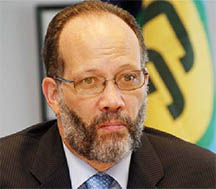Once I had read and re-read Dr Ralph Gonsalves’s address to the opening of the Twenty Fifth Inter-Sessional Meeting of the Conference of Caribbean Community (CARICOM) Heads of Government it was inevitable that it would be set aside for publication in this issue of the Guyana Review. Frankly, I had been attracted to what I considered to be its surprising bluntness on a delicate issue…ho’s really to blame for some of the critical weaknesses in CARICOM.
Professor Gonsalves is by no means the first West Indian academic to find his way to the pinnacle of his country’s politics. He has, too, been one of those regional academics-turned-politician who has left neither his intellectual acumen nor his innate radicalism behind. On this occasion he brought both to bear to impressive effect.
His speech in St Lucia at the regional Inter-Sessional Forum is not the first occasion on which Dr Gonsalves has leapt ahead of his colleagues with his forthrightness on a particular issue; except that this time around it seemed that he had, without so much as a trace of mischief, poked his finger in the eyes of his colleagues. That, I submit, may have been just my own imagination, though it is hard to believe that, at the very least, the former University of the West Indies Professor was not seeking to provide his colleagues with a lesson on what the Caribbean Community really is.

The ‘tutorial’ came too on the heels of the celebration of CARICOM’s fortieth anniversary, so that the forum of the Twenty Fifth Inter-sessional Meeting was a more than fitting place to ‘talk shop,’ to undertake an introspective assessment of the fortunes of the Community.
Gonsalves began his presentation by conceding that setting aside the “wide range of achievements, some of which are impressive, others modest…there have also been “setbacks, disappointments and failures.”
That was a hastily laid foundation for an ‘innings’ in which he made it clear that he was, whatever its shortcomings, there to ‘bat’ for CARICOM, not just for the institution but, equally, for its much-maligned Georgetown-based Secretariat.
Dr Gonsalves is altogether correct in his assertion regarding what often is a mind-boggling misperception among high level officials regarding what CARICOM is and what it can do.
CARICOM, Dr. Gonsalves asserts, “is not a unitary state; it is not a federation; it is not even a confederation. The Revised Treaty of Chaguaramas conceives it as a community of sovereign states.”
Here was a CARICOM Head of Government not only quite prepared to point to the overwhelming limitations of the regional movement but even to have the ‘gall’ to speak openly about its “weak superstructure which constantly gropes for consensus” in the presence of his assembled colleagues.
It was a sharp departure from the fantasy world in which animated, idealistic integrationists live. And here was Dr. Gonsalves saying to them that what they continually see as a regional movement that can be all things to all people, is, in reality, a strictly limited institution, “no more than the market can bear.”
And Dr Gonsalves is right. All too often examples of a lack of the requisite political will to make Caricom anything more than it is, rears its head.
There is, too, an irrefutable truth in Dr. Gonsalves’s assertion that “neither the political leadership as a collective nor the populations as a whole have an appetite for much more than what is currently on offer in the Treaty commitments.” Caricom may be a noble and even – to some extent – workable idea. Supranationalism is a different kettle of fish.
“So,” says Dr. Gonsalves, “our political mandate is to ensure that what is fashioned in the Revised Treaty is implemented optimally.” In other words, let’s get real.’ And in truth, it seems, more often than not, that it has been the inability of CARICOM Heads to ‘get real’ that has placed limitations on what it can accomplish.
But Dr. Gonsalves was not yet done with cutting to the bone of CARICOM, seeking to get to the heart of some of the regional organization’s real maladies. Next he touched on the issue of ensuring “that the organs of the Community work as intended and that its decisions are implemented in each nation-state of the Community and thirdly, that the political leaders and populations in each nation-state possess the requisite political will for CARICOM’s optimal functioning.” It is here that the rubber really hits the road for even as CARICOM governments blame its institutions for failures the real truth is that as we say in the region – they are simply talking through their hats, unable to bear their truth of their own culpability.
Inevitabily, he arrives at the doorstep of the CARICOM Secretariat which, invariably and wrongly in his opinion, is habitually “excoriated” for the regional movement’s “implementation deficit.”
He reminds that contrary to what even some CARICOM Heads sometimes appear to believe, the Secretariat is not CARICOM” and that “it possesses no authority to compel enforcement of decisions of the various Councils of Ministers and the Heads of State and Government Conference.” It is “the governments of nation-states,” in the absence of an Executive CARICOM Commission, that bears the responsibility “for the implementation of CARICOM’s decisions.”
Not that the shortcomings of the Secretariat escape Dr. Gonsalves’ attention. He alludes to limitations in the delivery of the Secretariat’s administrative and coordination functions” but refuses to blame it for “the implementation deficit” placing that responsibility squarely at the door of national governments…” vaunted change-drivers,” he says, “cannot reasonably facilitate meaningful change in decision-making and implementation in CARICOM if the individual governments or several of them do not embrace a commitment, made manifest through structured arrangements.”
The success of the CARICOM enterprise, he says, begins with the political leadership…and none of his colleagues are about to challenge him.
Arnon Adams





